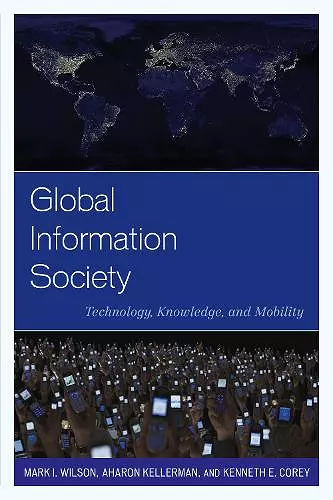Global Information Society
Technology, Knowledge, and Mobility
Mark I Wilson author Aharon Kellerman author Kenneth E Corey author
Format:Hardback
Publisher:Rowman & Littlefield
Published:11th Apr '13
Currently unavailable, and unfortunately no date known when it will be back
This hardback is available in another edition too:
- Paperback£40.00(9780742556942)

We have been living and working in the information society for decades, yet still we struggle to understand and keep up in the face of its constant flux and vast scope. In this unique interdisciplinary text, three scholars at the forefront of this dynamic field provide a clear conceptual framework and interpretation of the global information society. They explain the three pillars of the information society—technology, knowledge, and mobility—and the global information society as a whole, both as an interconnected web and a regionally distinct phenomenon. Offering a nuanced understanding of this complex subject, this book will enable students to navigate and thrive in the dynamic and evolving world of information and communication technology.
This book, part of the 'Human Geography in the Twenty-First Century' series, is aptly titled. The underlying focus is the impact of society's new and vast ability to access information and communicate rapidly worldwide. The first part of the book primarily provides observational aspects of an information society and attempts to define those observations. The chapters in part 2, 'Mapping the Global Information Society,' discuss different geographic areas. This section is very important since the likely readership will be from the US, and getting an international perspective on the impact of information can be enlightening. The third section builds on the previous chapters to show the importance of good policy and planning. Readers may find the makeup of the authors unique. Wilson and Corey (both, Michigan State) and Kellerman (emer., Univ. of Haifa, Israel) have combined expertise in the fields of geography and urban/regional planning and design; their writing reflects their wide range of experience in these areas. The emphasis of the book is not necessarily on technology itself, but on analyzing the policy and planning behind the rollout of technological innovations and their impact on different regions of the world and different population subsets. Summing Up: Recommended. Lower-division undergraduates through researchers/faculty; general readers. * CHOICE *
[T]he book has something for everyone. For those needing a succinct summary of the intellectual underpinnings of the information society, or a brief compendium of data on nearly all countries, the book has little competition. For those needing guidance on how to involve stakeholders in a serious attempt to grapple locally with global change, that is here, too. * AAG Review of Books *
Global Information Society . . . offers a helping hand at a particularly important time when changes in technology, the economy, and our society continue to gather pace. The book takes the readers on a historical journey, explaining how the concept of information society has come about; the opportunities and challenges involved from multiple perspectives and at different levels of analysis; how it has evolved to its current form; and to a lesser extent, where it might be going next. . . . Written by three distinguished digital immigrants who have witnessed, experienced, and researched the transition from the industrial to the information society over several decades . . . the book reminds the readers that the world did not become an information society overnight. The transition, however turbulent, radical, and revolutionary some of the changes have been, took decades to evolve and take hold. . . . The historical reviews and analytical frameworks presented in the book will not only help the readers make sense of the rapidly changing world in the global information society, but also gain the confidence and conviction to pursue new economic and social opportunities going forward. * Economic Geography *
Global Information Society: Technology, Knowledge, and Mobility authors Mark I.Wilson, Aharon Kellerman and Kenneth E.Corey are very clear in their intentions for this book: to 'empower its reader to understand the complexities of the networked global information society and to use that understanding to promote awareness and to positively effect change.' That this work is intended to facilitate the work of practitioners in the field of information and communication technology (ICT) development is a point the authors frequently return to throughout the text, but students of the field will also find this book highly useful. . . .Though this book is written with planners and ICT development professionals in mind, it is an excellent resource for those who want to learn more about the practicalities of ICT development planning or who are looking for a primer on the information society.The text combines dense theory with practical application in a straightforward, engaging, and highly readable manner. * Geographical Review *
This book offers a welcome call toward harnessing the power of the citizenry of the information society to help create better futures for locales around the world. -- Matthew Zook, University of Kentucky
Global knowledge production, consumption, and exchange—whether print, visual, or social media—are challenges facing individuals, societies, governments, and also members of interdisciplinary scholarly communities. This volume provides a detailed, engaging, and thoughtful discussion on the regional impacts of information and communication technologies and recent and prospective technological innovations. -- Stanley D. Brunn, editor of Collapsing Space and Time: A Geography of Information and Communication
ISBN: 9780742556935
Dimensions: 236mm x 160mm x 21mm
Weight: 494g
264 pages